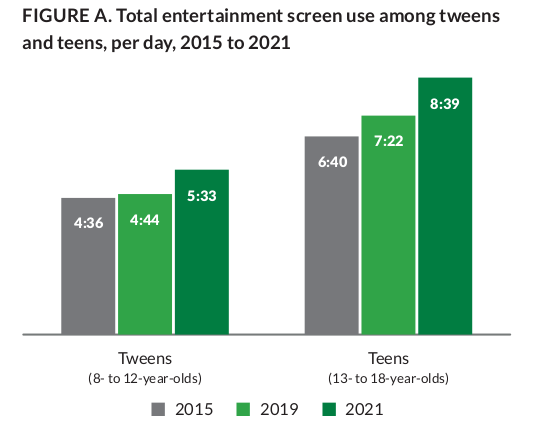Senators on Social Media: The Screen Time Fallacy
Four senators published a statement about the need to further regulate social media. Their arguments about screen time are severely misleading and flawed.
In a statement titled It’s time to protect kids on social media, four U.S. senators argue that social media must be further regulated in the interest of children.
This may be so, but their arguments regarding screen time are severely misleading and flawed.
Screen Time
The senators portray social media as the primary reason why kids spend inordinate amounts of time in front of screens:
Teenagers report spending nearly nine hours every day in front of screens. More than half of adolescents say their use of social media is “nearly ubiquitous.” Four out of five kids report spending more time than they intended online, and more than 60 percent report trying and failing to quit social media — possible signs of dependency and addiction.
The technology industry bears much of the blame for keeping children locked to their screens. Social media platforms use powerful algorithms to hook users and keep them scrolling as long as possible. The financial incentive to addict the young is clear: The more time users spend on apps such as Facebook or Snapchat, the more money those companies make from advertising — and the more targeted, and thus more valuable, those ads will become.
In reality, sites commonly classified as social media, such as Facebook and Instagram, are not the main contributors to screen time.
The nine hours figure comes from The Common Sense Census: Media Use by Tweens and Teens:
According to this survey, however, social media are a negligible contributor to screen time among preteens (18 minutes a day) and only a minor contributor among teens (1.5 hours). Teens and especially preteens spend the vast majority of their screen time watching TV or videos and playing games — see Table A of the report.
The census treats watching videos separately from participating in social media, which makes sense given that the vast majority of such video viewing is done without forming any social bonds with the content producers, just like on Netflix. This is fundamentally different from social media engagement where interactions with others are facilitated and encouraged (Facebook, Instagram, Twitter, and so on).
One may object that video sites like YouTube and TikTok should be counted as social media. The problem is that videos on these sites can be easily viewed by minors without the creation of an account and without any social interaction. In other words, the social media nature of YouTube and TikTok is irrelevant in regards to the mere passive viewing of videos by minors — an activity that is not inherently social at all.
Simply put, there is no reason to think that anything short of restricting the ability of minors to view TV and videos will substantially reduce their screen time.
Interestingly, the senators never even mention YouTube or TikTok or Netflix — instead they excoriate Instagram, Facebook, and Snapchat. And yet it is not the latter three that are primarily accountable for the massive amounts of time spent by most kids in front of screens!
Conclusion
Restricting the ability of minors to create social media accounts will not lead to substantial reductions in their screen time. To imply otherwise, as the senators do, is severely misleading.





The real elephant in the room is that the *adults* are NOT alright. Anyone who thinks that arbitrary age gating and other such band-aids are on philosophically stable ground will soon find themselves eating crow. So if we really want to solve this all-ages collective action problem, how about we officially declare a state of emergency and quarantine all social media for "just two weeks". Also have a smartphone buyback program like they do for guns. I am only half-joking about that.
(As for phone-free schools, fine. And how about phone-free workplaces as well?)
Of course, those are not permanent solutions, only enough to break the spell that Big Tech has over We the People. We actually need to FIX the internet for good. We need to throw the proverbial One Ring into the fires of Mount Doom by passing comprehensive data privacy legislation for all ages, and especially banning surveillance advertising. We need to audit the algorithms and make them public. We need to rein in the deliberately addictive features and "frictionless sharing" of these platforms. And of course, we need to go antitrust on Big Tech as well. Yesterday.
To the adults in the room: the life you save may very well be your own.
(Mic drop)